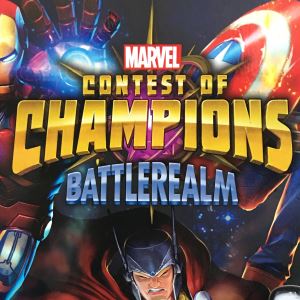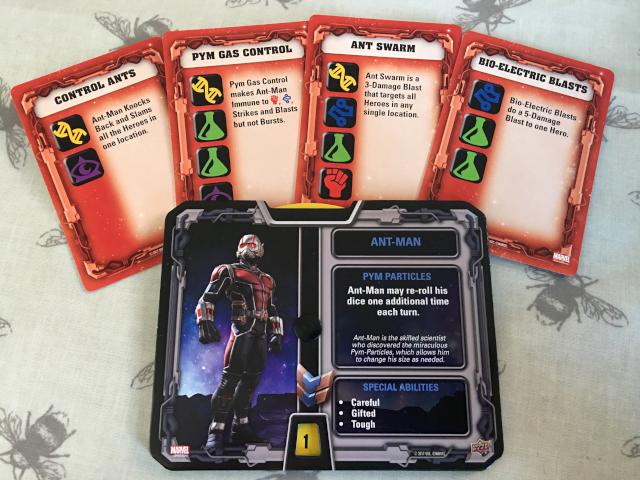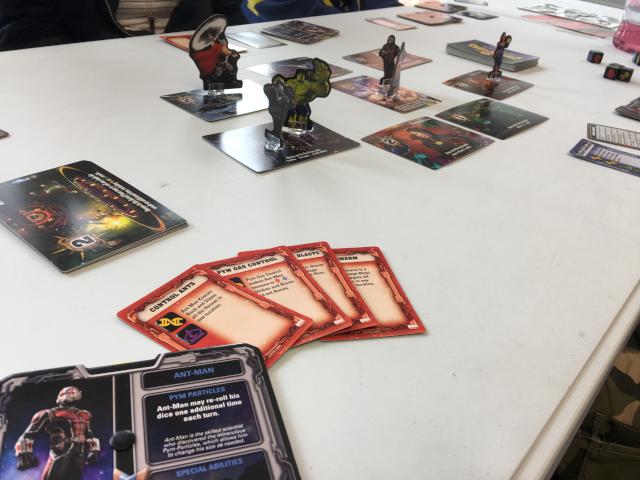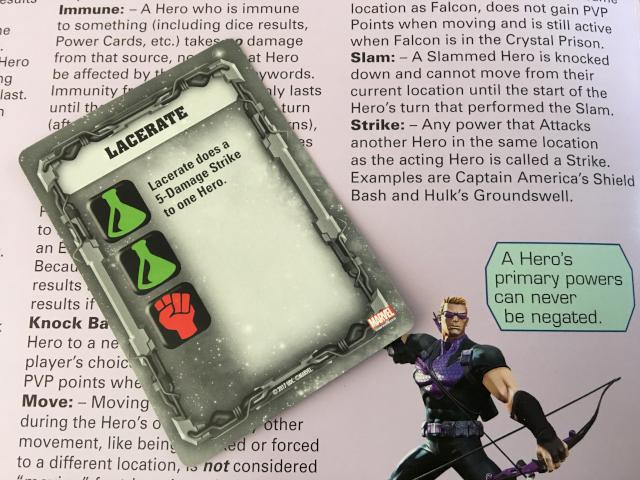
I’m a big fan of Upper Deck’s Marvel Legendary co-operative deckbuilder, and am a recent convert to Fantasy Flight Games’ Star Wars Destiny – a two player competitive dice and card battler. So when I heard that Upper Deck had taken their Marvel license and made a competitive card & dice game out of it, it sounded like a perfect combination.
Battlerealm is based on the mobile game “Marvel Contest of Champions” license, and essentially pits you as one of 13 Marvel heroes (curiously, no Spider-man), who are have been summoned and forced to fight each other to determine who is the victor. Interestingly the box art includes other characters not in the game either (Loki, Dr Strange, Scarlet Witch) so either they are planning to expand it, or were rather lazy in which (admittedly, great) art they cribbed from the mobile game.
In terms of components, they consist of a cardboard standee and scoring dial for each character. This keeps track of your score and summarises your unique abilities. You also get 4 cards to details your specific powers that can only be used once per round.

For setup, random location cards based on the number of players are chosen from the deck of 39, plus the “crystal prison”. Certain events will cause the locations to cycle out and be replaced throughout the game, keeping things fresh. You then place the locations in the centre of the table, with the crystal prison in the centre. Place your standee on the location you want to start at and off you go!
The aim of the game is to either be the last man standing, or be the first to reach 21 PVP points. I find it odd that the game insists on calling them PVP points, as though it is trying to distinguish them from some other points, but there are none. There are *only* PVP points. Anyway… Each player sets their points dial to their character-specific starting number, and then battle begins.
The basic mechanics are you roll and reroll a set of 6 dice to determine the combinations of actions you are able to take. There are six symbols on each dice representing Skill (melee attack at the same location), Tech (ranged attack at a different location), Cosmic (movement between locations), Mystic (gain a PVP point), and lastly Mutant and Science which do nothing on their own. So you can choose to concentrate on earning points for yourself, attacking others to cause them to lose points, or earn points by visiting locations.
In true Yahtzee style, you can do up to two rerolls of as many of them as you want, to try and get the symbols you want. Once you are done rolling, you can then resolve them in the order of your choice. For example, if you have 2 Skill and 1 Tech, you can punch someone in the same location as you twice, and then shoot someone in a different location once.
However, remember you have four special power cards? Well you can instead use the dice to pay for your special ability cards – so that same 2 Skill & 1 Tech could be used to trigger some sort of special attack that could cause more damage. You can trigger all these actions in the order you like, so can sometimes set up spectacular chains of destruction, such as blasting everyone in your location to an adjacent one, and then shooting them as they land there.
There are a couple of risks you have to take when rolling and rerolling your dice however – many of the special abilities require at least 2 Science or 2 Mutant… but rolling 3 of either of these causes something bad to happen. This adds a level of tension as you reroll to trigger your abilities.

Three Science causes a damaging explosion injuring everyone at your location, three Mutant send you to the Crystal Prison. Why? Who knows, the game doesn’t explain. On a positive note, you can’t be attacked in the prison, but at the same time you can’t attack anyone else – you can only escape by rolling 3 of any symbol on your next turn. In addition to this, each location has specific abilities you can use to affect your dice, with rules such as “treat all purple victory point sides as melee attacks”. So there is a lot of flexibility in how you roll your dice to the best effect.
So far so good, we have a pretty fun Yahtzee style game with a risk & reward mechanic that can often, literally, blow up in your face, with a great ebb and flow to the point scoring, winning points on a dice roll to take the lead, only to lose twice as many before your next go as everyone picks on you.
Just remember that this is a PVP game, the aim is to beat the other characters. If you make the same “mistake” we did, and only attack the person with the most points, the game time will stretch out – instead of taking the suggested 45 minutes our first game took 2 hours! Obviously you want to stop others from winning, but if we hadn’t gone easy on people when they were low on points the game might have been over much more quickly.
However what I haven’t touched on yet is an area the game falls down slightly. Each character has at least 3 traits that are shown as a single word on your score dial. For example, “Tough” means you can ignore 1 point of damage from anyone in the same location as you. This sounds straightforward but you do find yourself in a constant cycle of “right I’m going to punch you, oh wait you’re ‘tough’ so there’s no point”. So you are trying to remember what each character can and can’t do.
To complicate matters further, there is a glossary in the rule book that throws an easily avoidable spanner into the works. For example, Black Panther has a special ability card that says “Lacerate does a 5-damage Strike to one hero”. At first glance this looks a powerful attack you can use anywhere, yet when you look at this glossary, a Strike means an attack on a character at the same location as you – why not include this information on the card? It’s not as though they were short on space, as you can see below the card is almost entirely blank!

So the biggest downside to the game is this constant referring back and forth to double check what words mean, or what people can do, a lot of which could have been avoided by having that information to hand on your player score dial, or on the individual ability cards.
Having said all of that, we had great fun playing Battlerealm, and the mix of characters and locations ensures plenty of replayability. Yes it could try harder at giving thematic explanations as to why things are happening, yes it could do a better of job of ensuring you have the information you need to hand instead of referring back and forth, but once you have a few games under your belt, the terminology starts to stick, the logic stops mattering, and you can enjoy the game for what it is – a fast, fun, PVP game with (some of) your favourite Marvel heroes.

Leave a Reply